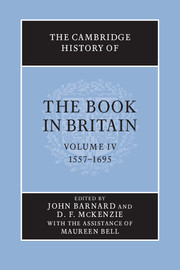Book contents
- Frontmatter
- Dedication
- Contents
- List of illustrations
- List of contributors
- Preface
- Acknowledgements
- Introduction
- RELIGION AND POLITICS
- ORAL TRADITIONS AND SCRIBAL CULTURE
- LITERATURE OF THE LEARNED
- LITERARY CANONS
- VERNACULAR TRADITIONS
- THE BUSINESS OF PRINT AND THE SPACE OF READING
- BEYOND LONDON: PRODUCTION, DISTRIBUTION, RECEPTION
- 32 The English provinces
- 33 Scotland
- 34 The book in Ireland from the Tudor re-conquest to the battle of the Boyne
- 35 Wales
- 36 British books abroad: the Continent
- 37 British books abroad: the American colonies
- DISRUPTION AND RESTRUCTURING: THE LATE SEVENTEENTH-CENTURY BOOK TRADE
- STATISTICAL APPENDICES
- Abbreviations
- Bibliography
- Index
- Plate Section
- References
37 - British books abroad: the American colonies
from BEYOND LONDON: PRODUCTION, DISTRIBUTION, RECEPTION
- Frontmatter
- Dedication
- Contents
- List of illustrations
- List of contributors
- Preface
- Acknowledgements
- Introduction
- RELIGION AND POLITICS
- ORAL TRADITIONS AND SCRIBAL CULTURE
- LITERATURE OF THE LEARNED
- LITERARY CANONS
- VERNACULAR TRADITIONS
- THE BUSINESS OF PRINT AND THE SPACE OF READING
- BEYOND LONDON: PRODUCTION, DISTRIBUTION, RECEPTION
- 32 The English provinces
- 33 Scotland
- 34 The book in Ireland from the Tudor re-conquest to the battle of the Boyne
- 35 Wales
- 36 British books abroad: the Continent
- 37 British books abroad: the American colonies
- DISRUPTION AND RESTRUCTURING: THE LATE SEVENTEENTH-CENTURY BOOK TRADE
- STATISTICAL APPENDICES
- Abbreviations
- Bibliography
- Index
- Plate Section
- References
Summary
The historians of seventeenth-century book culture in the British colonies have traditionally focused on the advent of printing and on the private libraries of a few distinguished bookmen: the Winthrops, the Mathers, Elder Brewster, John Harvard, Isaac Norris and William Byrd, among others.
This material may be fleshed out with inventories of books belonging to less distinguished owners, with the chance survivals of books with an early provenance, with auction catalogues and with anecdotal evidence, but essentially such history only begins after the books have crossed the Atlantic. The commerce that relates the English market for books with the colonies remains little explored.
Despite strong cultural, economic and demographic differences among the colonies, the book culture of the larger cities was surprisingly uniform. A few private libraries, such as those of the Mathers, the Winthrops, or the Byrds, ran to more than a thousand volumes – large by any seventeenth-century standard. Most magistrates and ministers however, held no more than two or three hundred volumes, housed in a ‘study’ or room of its own. The New England Company that prompted the ‘Great migration’ of 1630–40 offered ministers £10 for books, if they would settle there, and it is clear from the libraries of Elder Brewster and John Harvard that they continued to purchase titles from Europe after their emigration. Libraries of these middling sizes belonged to persons who were in more-or-less regular official or personal communication with Europe; owners of smaller libraries contented themselves with the books that they, or their ancestors, had brought over in person.
Keywords
- Type
- Chapter
- Information
- The Cambridge History of the Book in Britain , pp. 744 - 752Publisher: Cambridge University PressPrint publication year: 2002
References
- 1
- Cited by

